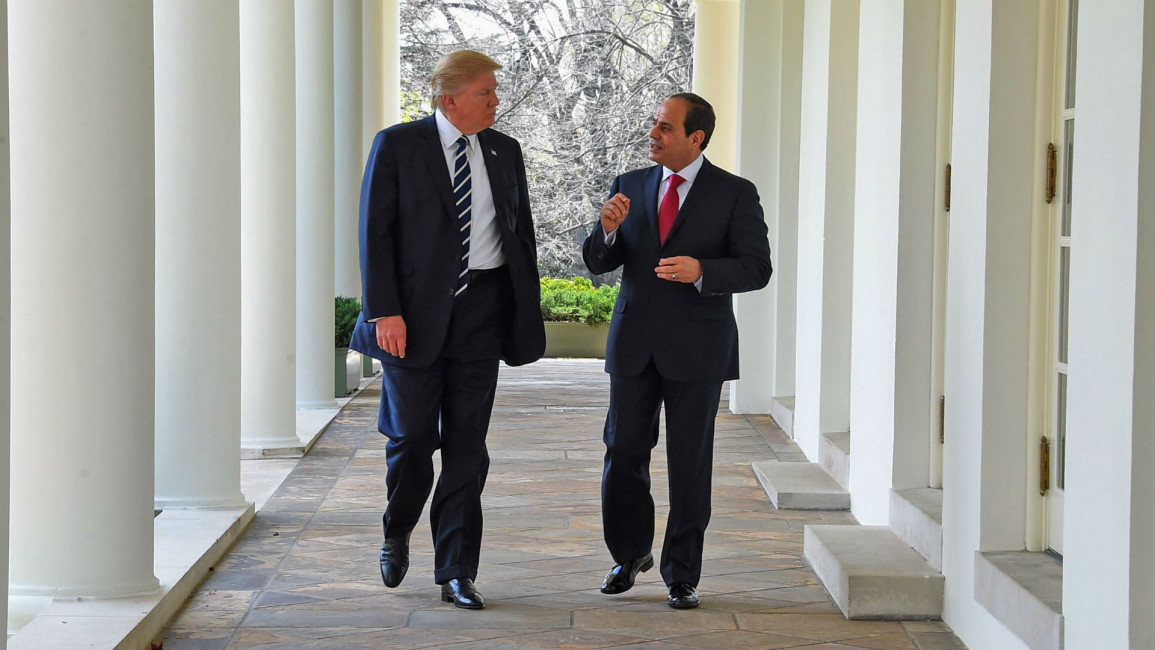American PR firm ends controversial contract with Egypt's spy agency
American PR firm ends controversial contract with Egypt's spy agency
A US company hired to boost Egypt's image in Washington has withdrawn from its contract after just six months - days after being criticised for helping Sisi's authoritarian regime.
3 min read
PR firm Weber Shandwick was hired by the Egyptian government to boost its image [Getty]
An American PR firm hired by Egypt's government to boost its image has pulled its contract after just six months.
In a deal worth $1.2 million a year, the General Intelligence Service - Egypt's powerful intelligence agency known as the Mukhabarat - hired Washington-based public relations firm Weber Shandwick to assist Egypt in promoting its "strategic partnership with the United States".
The deal, struck eight days after Trump's inauguration, included highlighting its economic development, showcasing its civil society and publicising Egypt's "leading role in managing regional risks" - all pointing to President Abdel Fattah al-Sisi's desire to win friends in Congress who oversee Egypt's substantial aid package.
The company's withdrawal comes following a critical exposé published by The Atlantic questioning why Weber was doing business with "a foreign-intelligence service known for torture and repression", and had been "instrumental" to Sisi's crackdown on the Muslim Brotherhood and its supporters.
'Vibrant, stable place'
The Atlantic reported the firm began its work for Egypt by creating a catchy brand name, "Egypt Forward," and setting up a website and Twitter account to "churn out a steady diet of upbeat videos and articles characterising Egypt as a vibrant, stable place, marching toward a more democratic and inclusive society".
Weber's work also involved persuading US authorities to label the Muslim Brotherhood a terrorist organisation. The Islamist party won Egypt's first democratic elections in 2012, and were then overthrown by Sisi who led a popular military coup to oust the Brotherhood government of Mohamed Morsi. Sisi then spearheaded a bloody crackdown on the party’s supporters.
"Since Weber Shandwick signed the deal with Egypt, Sisi has intensified his crackdown, blocking access to newspapers and imprisoning opposition figures," The Atlantic reported.
'Praising Sisi'
At a Senate hearing in April concerning Egypt's foreign aid package in context of its human rights record, Weber reportedly distributed a glossy publication touting Egypt as a "stable and reliable" partner, and praising Sisi's record of "improvements in the social, political, economic institutions of the nation, and the civil rights of the people".
Weber Shandwick did not respond to the criticisms of The Atlantic, but on Tuesday, the agency's spokeswoman Michele Guida told PR trade news website PR Week that Weber had reviewed its accounts on behalf of foreign governments and "decided to discontinue work with the government of Egypt".
In a deal worth $1.2 million a year, the General Intelligence Service - Egypt's powerful intelligence agency known as the Mukhabarat - hired Washington-based public relations firm Weber Shandwick to assist Egypt in promoting its "strategic partnership with the United States".
The deal, struck eight days after Trump's inauguration, included highlighting its economic development, showcasing its civil society and publicising Egypt's "leading role in managing regional risks" - all pointing to President Abdel Fattah al-Sisi's desire to win friends in Congress who oversee Egypt's substantial aid package.
The company's withdrawal comes following a critical exposé published by The Atlantic questioning why Weber was doing business with "a foreign-intelligence service known for torture and repression", and had been "instrumental" to Sisi's crackdown on the Muslim Brotherhood and its supporters.
'Vibrant, stable place'
The Atlantic reported the firm began its work for Egypt by creating a catchy brand name, "Egypt Forward," and setting up a website and Twitter account to "churn out a steady diet of upbeat videos and articles characterising Egypt as a vibrant, stable place, marching toward a more democratic and inclusive society".
Weber's work also involved persuading US authorities to label the Muslim Brotherhood a terrorist organisation. The Islamist party won Egypt's first democratic elections in 2012, and were then overthrown by Sisi who led a popular military coup to oust the Brotherhood government of Mohamed Morsi. Sisi then spearheaded a bloody crackdown on the party’s supporters.
"Since Weber Shandwick signed the deal with Egypt, Sisi has intensified his crackdown, blocking access to newspapers and imprisoning opposition figures," The Atlantic reported.
'Praising Sisi'
At a Senate hearing in April concerning Egypt's foreign aid package in context of its human rights record, Weber reportedly distributed a glossy publication touting Egypt as a "stable and reliable" partner, and praising Sisi's record of "improvements in the social, political, economic institutions of the nation, and the civil rights of the people".
Weber Shandwick did not respond to the criticisms of The Atlantic, but on Tuesday, the agency's spokeswoman Michele Guida told PR trade news website PR Week that Weber had reviewed its accounts on behalf of foreign governments and "decided to discontinue work with the government of Egypt".
Cassidy & Associates, a subsidiary of Weber, which was also hired in January, said it will continue lobbying on behalf of the Egyptian government.
"Egypt is a long-standing ally of the United States and plays a key role in the fight against terrorism," the firm said in a statement.
"Cassidy & Associates looks forward to continuing to represent the government of Egypt and highlight this important relationship with policy makers on Capitol Hill and in the administration."



